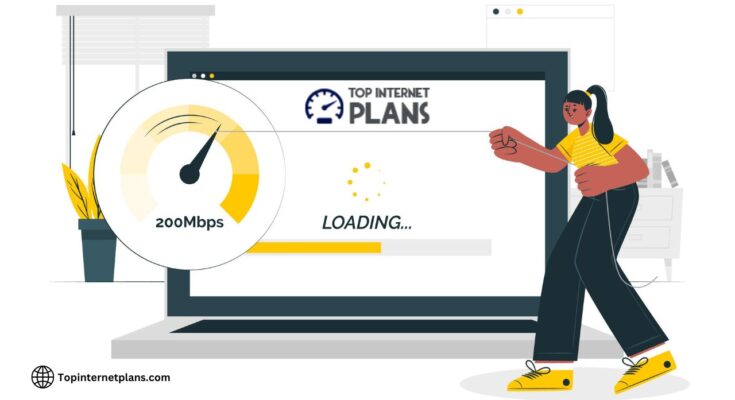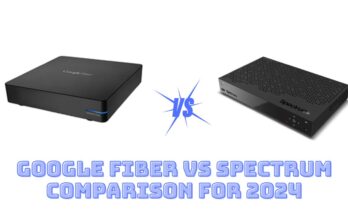In our interconnected modern society, a swift internet connection has become a necessity, as life without it can be burdensome. Productivity suffers, streaming media buffers unnecessarily, and file downloads seem to be more time taken.
While we all desire an excellent online experience, internet speed entails more than what meets the surface. Internet providers often emphasize download speeds, but the importance of upload speed should not be underestimated. In this article, we focus on the difference between download and upload speed, exploring which of these aspects can create a great impact when selecting an internet service provider.
Download speed and upload speed are two fundamental aspects of an internet connection that play different roles in how data is transferred between your device and the internet. Here are the top 10 differences between download speed and upload speed.
Top Ten Differences Between Download and Upload Speed
Direction of Data Transfer
Download Speed demonstrates the rate at which data is shared from the internet to your device like downloading files, streaming videos, etc. While upload speed demonstrated the rate at which data is shared from your device to the internet like uploading files, sending emails, etc. To know what is download speed for direct data transfer, you need to calculate the timing during the download. However, there are various tools to measure download and upload speed.
- User Activities
Download Speed is crucial for activities such as streaming videos, downloading files, browsing websites, and online gaming. While upload speed is important for activities like video conferencing, online live streaming, uploading files to cloud services, and sharing content on social media.
- Asymmetry
Typically higher than upload speed in most internet plans, reflecting the typical user’s consumption-oriented usage pattern is download speed. Generally lower than download speed because it aligns with the assumption that users create less content compared to what they consume. It is upload speed.
- Streaming Quality
Download Speed affects the quality and smoothness of videos or audio streams, with higher download speeds leading to better streaming experiences. While upload speed affects your ability to stream content or participate in live streaming events, smoother and higher-quality broadcasting.
- Online Gaming
With download speed, you can quickly download game updates and access gaming content from the internet. Whereas upload speed affects your ability to send data to the game servers, such as your actions and commands, which is critical for multiplayer gaming. This way you can see the primary difference between download and upload speed for gaming.
- Cloud Services
Download Speed influences how fast you can access files, documents, and media stored in cloud services. While upload speed determines how quickly you can upload files to cloud storage or share them with others.
- Video Conferencing
Download speed affects the quality and smoothness of video conferences, particularly for receiving video and audio from other participants. While upload speed determines the quality of your video and audio stream sent to other participants during video conferences.
- Social Media and Content Sharing
Download speed impacts how fast you can view images, videos, and other content shared by others on social media platforms. While upload speed influences how quickly you can share your own content, such as photos or videos, on social media platforms. With this comparison, you can check out what is good upload speed while sharing social media content.
- Backup and Sync
Download speed determines how fast you can restore or download files from backups or sync services. While upload speed affects how quickly your files get backed up to cloud storage or synced across devices.
Internet Plan Emphasis
Download speed is often emphasized in marketing materials because it aligns with the needs of most users who consume more than they create. While upload speed is less emphasized but becoming increasingly important as content creation, video conferencing, and remote work become more common.
What to Choose Between Download and Upload Speed?
The preference between download and upload speed depends on how you primarily use the internet and what activities are most important to you. Both download and upload speeds are crucial for different online activities. Here’s a breakdown of their significance:
Download Speed
The rate at which data is moved from the internet to your device is the download speed.
- It is essential for activities like streaming videos, downloading files, browsing websites, and online gaming.
- If you frequently watch movies, play online games, or download large files, a higher download speed is beneficial to ensure smooth and fast access to content.
Upload Speed
On the other hand, the rate at which data is moved from your device to the internet is the upload speed.
- It is crucial for activities like video conferencing, online live streaming, uploading files to cloud services, and sharing content on social media.
- If you regularly upload videos, engage in video conferencing, or work with large files, a higher upload speed is essential to ensure quick and efficient data transfer.
In many standard internet plans, the download speed is usually higher than the upload speed because it aligns with the typical usage patterns of most users who consume more content than they create and upload. However, with the rise of remote work, online content creation, and video conferencing, the importance of upload speed has grown for certain users. You can also know what is good upload speed for gaming or other purposes.
Ultimately, the ideal scenario is to have a balanced internet connection with both download and upload speeds that meet your specific needs. For most users, a balanced connection with reasonable speeds for both downloading and uploading is preferred to ensure a smooth online experience regardless of the activity. If you find yourself regularly frustrated by either slow download or upload speeds, consider upgrading your internet plan to better suit your requirements.
Conclusion
Balancing both download and upload speeds according to your specific needs is essential for a smooth and efficient online experience, whether you’re streaming content, collaborating with colleagues, or sharing media with friends and family.
In brief, download speed refers to the rate at which data is received from other computers onto your home network, while upload speed pertains to the speed at which data is sent from your network to other computers online. Consider these lines as the basic difference between download and upload speed.
Opting for an internet provider with a fast download speed but a comparatively slower upload speed can sometimes result in cost savings. For the average user, an upload speed of approximately 5 Mbps is typically sufficient. However, individuals who engage in content creation and intensive internet activities may find it beneficial to select an internet service plan that offers both rapid download and upload speeds.



